Access to Justice: Barriers, Responsibilities, and Reform Strategies
VerifiedAdded on 2022/09/14
|12
|3491
|11
Essay
AI Summary
This essay delves into the multifaceted problem of access to justice, examining various factors that contribute to its inaccessibility worldwide. It highlights the roles of law societies, governments, and the legal profession in perpetuating and addressing these challenges. The essay discusses issues such as the economic barriers to legal services, the complexity of legal language and procedures, and the responsibilities of the judiciary. It analyzes the impact of government policies, the commercialization of the legal profession, and the importance of judicial reform, including alternative dispute resolution and the reformative approach of the court system. The author emphasizes the need for increased affordability of legal services, simplification of legal processes, and the importance of legal knowledge in educational curricula. The essay underscores the significance of a fair and efficient judicial system as the foundation of justice, advocating for reformative and deterrent punishment theories.
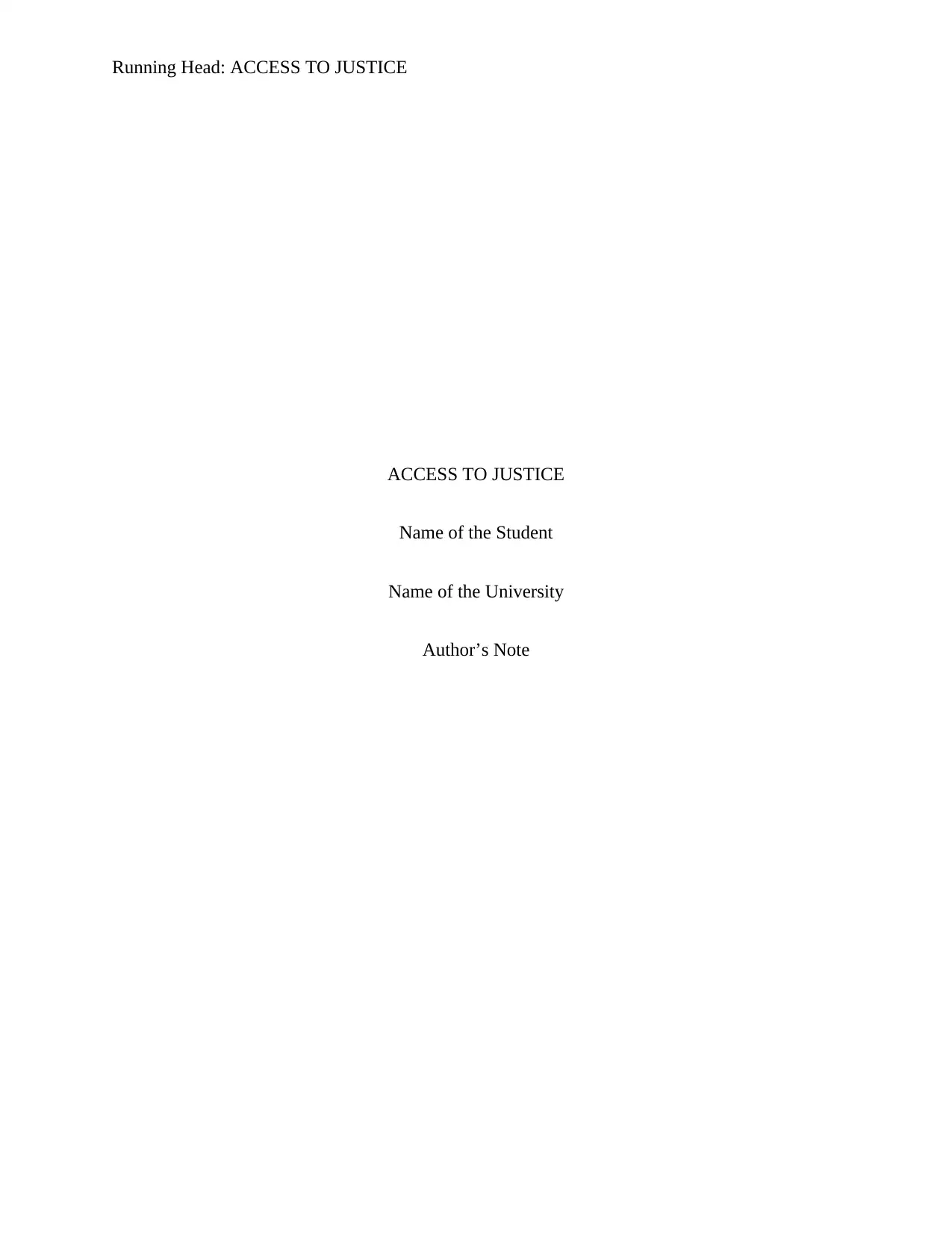
Running Head: ACCESS TO JUSTICE
ACCESS TO JUSTICE
Name of the Student
Name of the University
Author’s Note
ACCESS TO JUSTICE
Name of the Student
Name of the University
Author’s Note
Paraphrase This Document
Need a fresh take? Get an instant paraphrase of this document with our AI Paraphraser
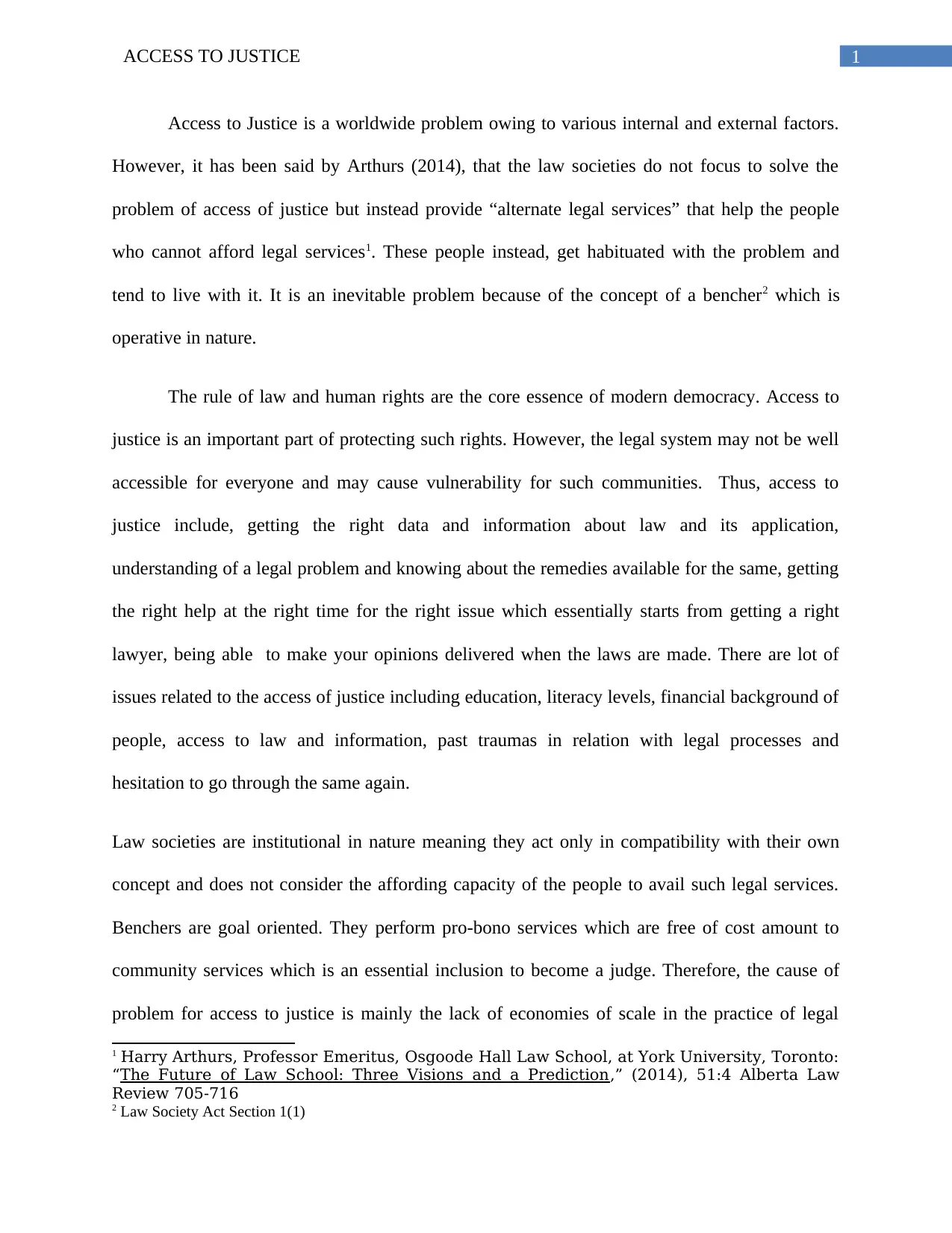
1ACCESS TO JUSTICE
Access to Justice is a worldwide problem owing to various internal and external factors.
However, it has been said by Arthurs (2014), that the law societies do not focus to solve the
problem of access of justice but instead provide “alternate legal services” that help the people
who cannot afford legal services1. These people instead, get habituated with the problem and
tend to live with it. It is an inevitable problem because of the concept of a bencher2 which is
operative in nature.
The rule of law and human rights are the core essence of modern democracy. Access to
justice is an important part of protecting such rights. However, the legal system may not be well
accessible for everyone and may cause vulnerability for such communities. Thus, access to
justice include, getting the right data and information about law and its application,
understanding of a legal problem and knowing about the remedies available for the same, getting
the right help at the right time for the right issue which essentially starts from getting a right
lawyer, being able to make your opinions delivered when the laws are made. There are lot of
issues related to the access of justice including education, literacy levels, financial background of
people, access to law and information, past traumas in relation with legal processes and
hesitation to go through the same again.
Law societies are institutional in nature meaning they act only in compatibility with their own
concept and does not consider the affording capacity of the people to avail such legal services.
Benchers are goal oriented. They perform pro-bono services which are free of cost amount to
community services which is an essential inclusion to become a judge. Therefore, the cause of
problem for access to justice is mainly the lack of economies of scale in the practice of legal
1 Harry Arthurs, Professor Emeritus, Osgoode Hall Law School, at York University, Toronto:
“The Future of Law School: Three Visions and a Prediction,” (2014), 51:4 Alberta Law
Review 705-716
2 Law Society Act Section 1(1)
Access to Justice is a worldwide problem owing to various internal and external factors.
However, it has been said by Arthurs (2014), that the law societies do not focus to solve the
problem of access of justice but instead provide “alternate legal services” that help the people
who cannot afford legal services1. These people instead, get habituated with the problem and
tend to live with it. It is an inevitable problem because of the concept of a bencher2 which is
operative in nature.
The rule of law and human rights are the core essence of modern democracy. Access to
justice is an important part of protecting such rights. However, the legal system may not be well
accessible for everyone and may cause vulnerability for such communities. Thus, access to
justice include, getting the right data and information about law and its application,
understanding of a legal problem and knowing about the remedies available for the same, getting
the right help at the right time for the right issue which essentially starts from getting a right
lawyer, being able to make your opinions delivered when the laws are made. There are lot of
issues related to the access of justice including education, literacy levels, financial background of
people, access to law and information, past traumas in relation with legal processes and
hesitation to go through the same again.
Law societies are institutional in nature meaning they act only in compatibility with their own
concept and does not consider the affording capacity of the people to avail such legal services.
Benchers are goal oriented. They perform pro-bono services which are free of cost amount to
community services which is an essential inclusion to become a judge. Therefore, the cause of
problem for access to justice is mainly the lack of economies of scale in the practice of legal
1 Harry Arthurs, Professor Emeritus, Osgoode Hall Law School, at York University, Toronto:
“The Future of Law School: Three Visions and a Prediction,” (2014), 51:4 Alberta Law
Review 705-716
2 Law Society Act Section 1(1)
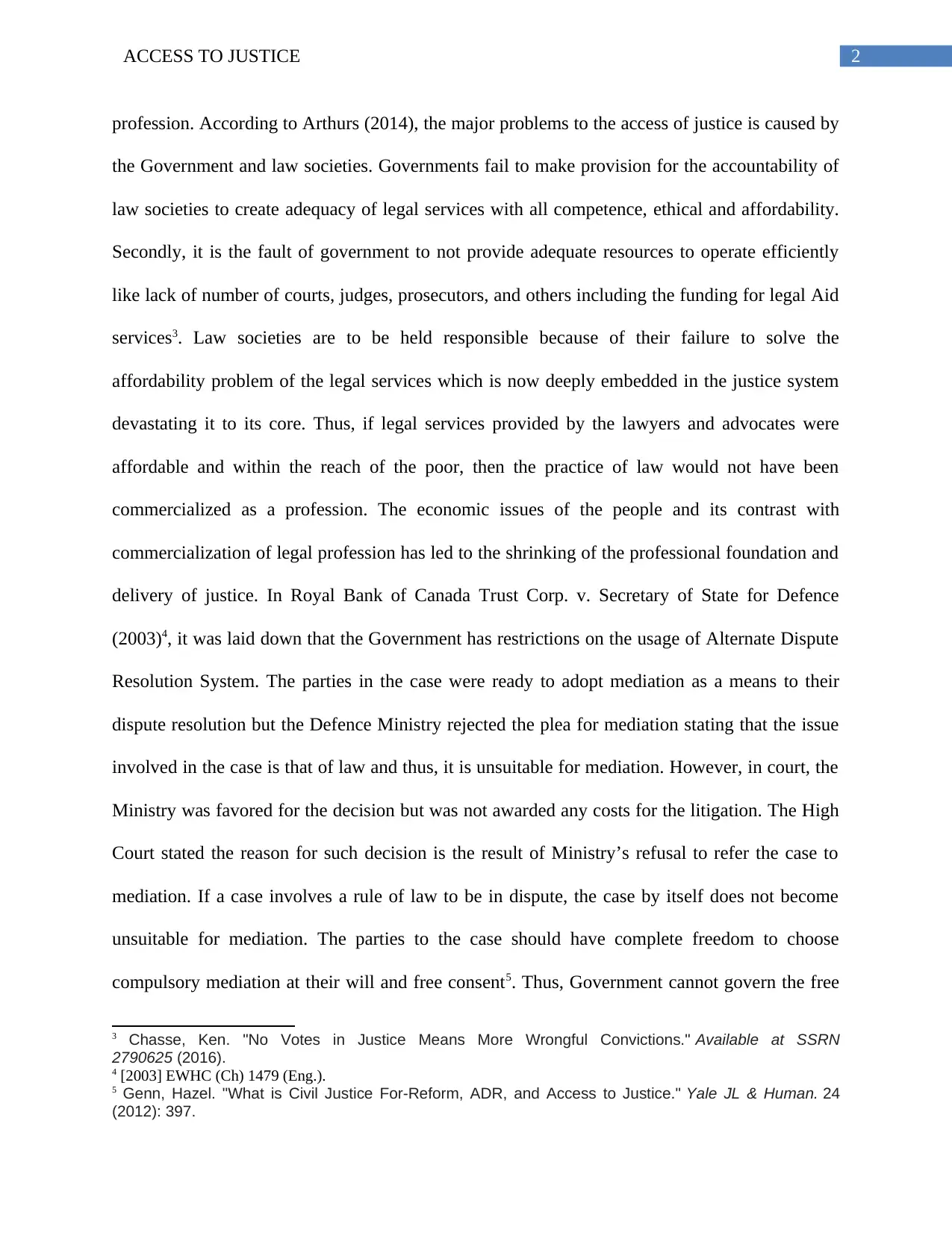
2ACCESS TO JUSTICE
profession. According to Arthurs (2014), the major problems to the access of justice is caused by
the Government and law societies. Governments fail to make provision for the accountability of
law societies to create adequacy of legal services with all competence, ethical and affordability.
Secondly, it is the fault of government to not provide adequate resources to operate efficiently
like lack of number of courts, judges, prosecutors, and others including the funding for legal Aid
services3. Law societies are to be held responsible because of their failure to solve the
affordability problem of the legal services which is now deeply embedded in the justice system
devastating it to its core. Thus, if legal services provided by the lawyers and advocates were
affordable and within the reach of the poor, then the practice of law would not have been
commercialized as a profession. The economic issues of the people and its contrast with
commercialization of legal profession has led to the shrinking of the professional foundation and
delivery of justice. In Royal Bank of Canada Trust Corp. v. Secretary of State for Defence
(2003)4, it was laid down that the Government has restrictions on the usage of Alternate Dispute
Resolution System. The parties in the case were ready to adopt mediation as a means to their
dispute resolution but the Defence Ministry rejected the plea for mediation stating that the issue
involved in the case is that of law and thus, it is unsuitable for mediation. However, in court, the
Ministry was favored for the decision but was not awarded any costs for the litigation. The High
Court stated the reason for such decision is the result of Ministry’s refusal to refer the case to
mediation. If a case involves a rule of law to be in dispute, the case by itself does not become
unsuitable for mediation. The parties to the case should have complete freedom to choose
compulsory mediation at their will and free consent5. Thus, Government cannot govern the free
3 Chasse, Ken. "No Votes in Justice Means More Wrongful Convictions." Available at SSRN
2790625 (2016).
4 [2003] EWHC (Ch) 1479 (Eng.).
5 Genn, Hazel. "What is Civil Justice For-Reform, ADR, and Access to Justice." Yale JL & Human. 24
(2012): 397.
profession. According to Arthurs (2014), the major problems to the access of justice is caused by
the Government and law societies. Governments fail to make provision for the accountability of
law societies to create adequacy of legal services with all competence, ethical and affordability.
Secondly, it is the fault of government to not provide adequate resources to operate efficiently
like lack of number of courts, judges, prosecutors, and others including the funding for legal Aid
services3. Law societies are to be held responsible because of their failure to solve the
affordability problem of the legal services which is now deeply embedded in the justice system
devastating it to its core. Thus, if legal services provided by the lawyers and advocates were
affordable and within the reach of the poor, then the practice of law would not have been
commercialized as a profession. The economic issues of the people and its contrast with
commercialization of legal profession has led to the shrinking of the professional foundation and
delivery of justice. In Royal Bank of Canada Trust Corp. v. Secretary of State for Defence
(2003)4, it was laid down that the Government has restrictions on the usage of Alternate Dispute
Resolution System. The parties in the case were ready to adopt mediation as a means to their
dispute resolution but the Defence Ministry rejected the plea for mediation stating that the issue
involved in the case is that of law and thus, it is unsuitable for mediation. However, in court, the
Ministry was favored for the decision but was not awarded any costs for the litigation. The High
Court stated the reason for such decision is the result of Ministry’s refusal to refer the case to
mediation. If a case involves a rule of law to be in dispute, the case by itself does not become
unsuitable for mediation. The parties to the case should have complete freedom to choose
compulsory mediation at their will and free consent5. Thus, Government cannot govern the free
3 Chasse, Ken. "No Votes in Justice Means More Wrongful Convictions." Available at SSRN
2790625 (2016).
4 [2003] EWHC (Ch) 1479 (Eng.).
5 Genn, Hazel. "What is Civil Justice For-Reform, ADR, and Access to Justice." Yale JL & Human. 24
(2012): 397.
⊘ This is a preview!⊘
Do you want full access?
Subscribe today to unlock all pages.

Trusted by 1+ million students worldwide
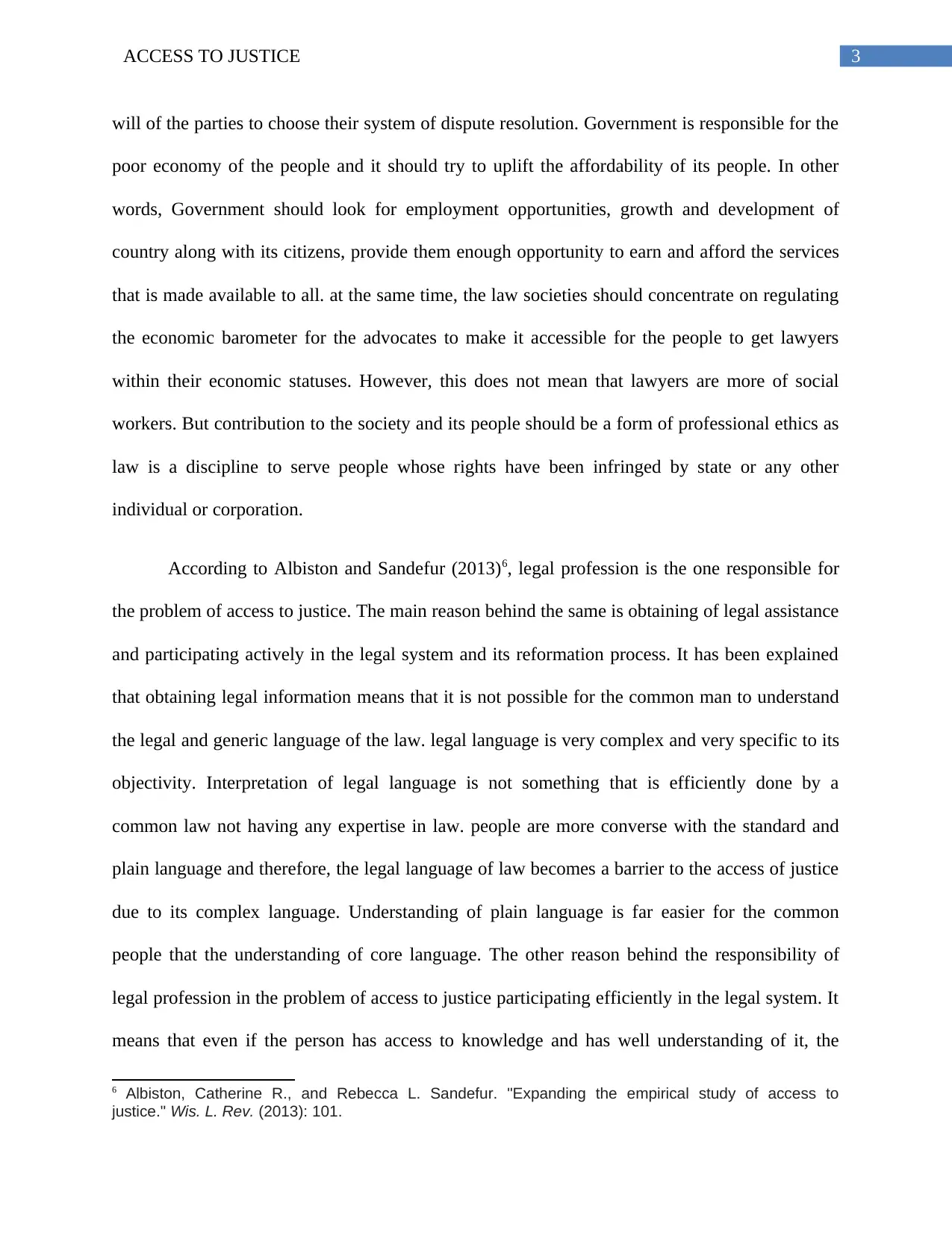
3ACCESS TO JUSTICE
will of the parties to choose their system of dispute resolution. Government is responsible for the
poor economy of the people and it should try to uplift the affordability of its people. In other
words, Government should look for employment opportunities, growth and development of
country along with its citizens, provide them enough opportunity to earn and afford the services
that is made available to all. at the same time, the law societies should concentrate on regulating
the economic barometer for the advocates to make it accessible for the people to get lawyers
within their economic statuses. However, this does not mean that lawyers are more of social
workers. But contribution to the society and its people should be a form of professional ethics as
law is a discipline to serve people whose rights have been infringed by state or any other
individual or corporation.
According to Albiston and Sandefur (2013)6, legal profession is the one responsible for
the problem of access to justice. The main reason behind the same is obtaining of legal assistance
and participating actively in the legal system and its reformation process. It has been explained
that obtaining legal information means that it is not possible for the common man to understand
the legal and generic language of the law. legal language is very complex and very specific to its
objectivity. Interpretation of legal language is not something that is efficiently done by a
common law not having any expertise in law. people are more converse with the standard and
plain language and therefore, the legal language of law becomes a barrier to the access of justice
due to its complex language. Understanding of plain language is far easier for the common
people that the understanding of core language. The other reason behind the responsibility of
legal profession in the problem of access to justice participating efficiently in the legal system. It
means that even if the person has access to knowledge and has well understanding of it, the
6 Albiston, Catherine R., and Rebecca L. Sandefur. "Expanding the empirical study of access to
justice." Wis. L. Rev. (2013): 101.
will of the parties to choose their system of dispute resolution. Government is responsible for the
poor economy of the people and it should try to uplift the affordability of its people. In other
words, Government should look for employment opportunities, growth and development of
country along with its citizens, provide them enough opportunity to earn and afford the services
that is made available to all. at the same time, the law societies should concentrate on regulating
the economic barometer for the advocates to make it accessible for the people to get lawyers
within their economic statuses. However, this does not mean that lawyers are more of social
workers. But contribution to the society and its people should be a form of professional ethics as
law is a discipline to serve people whose rights have been infringed by state or any other
individual or corporation.
According to Albiston and Sandefur (2013)6, legal profession is the one responsible for
the problem of access to justice. The main reason behind the same is obtaining of legal assistance
and participating actively in the legal system and its reformation process. It has been explained
that obtaining legal information means that it is not possible for the common man to understand
the legal and generic language of the law. legal language is very complex and very specific to its
objectivity. Interpretation of legal language is not something that is efficiently done by a
common law not having any expertise in law. people are more converse with the standard and
plain language and therefore, the legal language of law becomes a barrier to the access of justice
due to its complex language. Understanding of plain language is far easier for the common
people that the understanding of core language. The other reason behind the responsibility of
legal profession in the problem of access to justice participating efficiently in the legal system. It
means that even if the person has access to knowledge and has well understanding of it, the
6 Albiston, Catherine R., and Rebecca L. Sandefur. "Expanding the empirical study of access to
justice." Wis. L. Rev. (2013): 101.
Paraphrase This Document
Need a fresh take? Get an instant paraphrase of this document with our AI Paraphraser
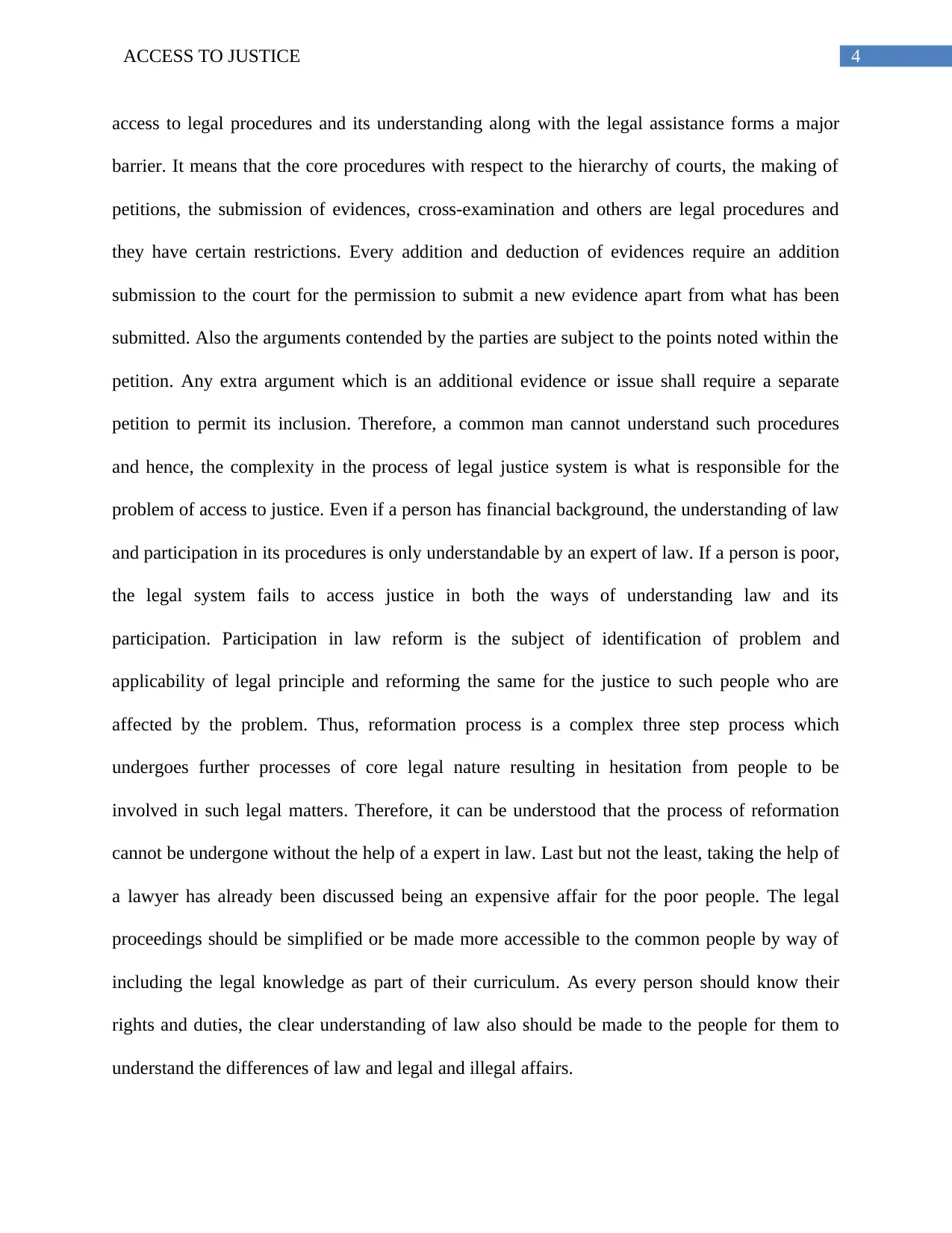
4ACCESS TO JUSTICE
access to legal procedures and its understanding along with the legal assistance forms a major
barrier. It means that the core procedures with respect to the hierarchy of courts, the making of
petitions, the submission of evidences, cross-examination and others are legal procedures and
they have certain restrictions. Every addition and deduction of evidences require an addition
submission to the court for the permission to submit a new evidence apart from what has been
submitted. Also the arguments contended by the parties are subject to the points noted within the
petition. Any extra argument which is an additional evidence or issue shall require a separate
petition to permit its inclusion. Therefore, a common man cannot understand such procedures
and hence, the complexity in the process of legal justice system is what is responsible for the
problem of access to justice. Even if a person has financial background, the understanding of law
and participation in its procedures is only understandable by an expert of law. If a person is poor,
the legal system fails to access justice in both the ways of understanding law and its
participation. Participation in law reform is the subject of identification of problem and
applicability of legal principle and reforming the same for the justice to such people who are
affected by the problem. Thus, reformation process is a complex three step process which
undergoes further processes of core legal nature resulting in hesitation from people to be
involved in such legal matters. Therefore, it can be understood that the process of reformation
cannot be undergone without the help of a expert in law. Last but not the least, taking the help of
a lawyer has already been discussed being an expensive affair for the poor people. The legal
proceedings should be simplified or be made more accessible to the common people by way of
including the legal knowledge as part of their curriculum. As every person should know their
rights and duties, the clear understanding of law also should be made to the people for them to
understand the differences of law and legal and illegal affairs.
access to legal procedures and its understanding along with the legal assistance forms a major
barrier. It means that the core procedures with respect to the hierarchy of courts, the making of
petitions, the submission of evidences, cross-examination and others are legal procedures and
they have certain restrictions. Every addition and deduction of evidences require an addition
submission to the court for the permission to submit a new evidence apart from what has been
submitted. Also the arguments contended by the parties are subject to the points noted within the
petition. Any extra argument which is an additional evidence or issue shall require a separate
petition to permit its inclusion. Therefore, a common man cannot understand such procedures
and hence, the complexity in the process of legal justice system is what is responsible for the
problem of access to justice. Even if a person has financial background, the understanding of law
and participation in its procedures is only understandable by an expert of law. If a person is poor,
the legal system fails to access justice in both the ways of understanding law and its
participation. Participation in law reform is the subject of identification of problem and
applicability of legal principle and reforming the same for the justice to such people who are
affected by the problem. Thus, reformation process is a complex three step process which
undergoes further processes of core legal nature resulting in hesitation from people to be
involved in such legal matters. Therefore, it can be understood that the process of reformation
cannot be undergone without the help of a expert in law. Last but not the least, taking the help of
a lawyer has already been discussed being an expensive affair for the poor people. The legal
proceedings should be simplified or be made more accessible to the common people by way of
including the legal knowledge as part of their curriculum. As every person should know their
rights and duties, the clear understanding of law also should be made to the people for them to
understand the differences of law and legal and illegal affairs.
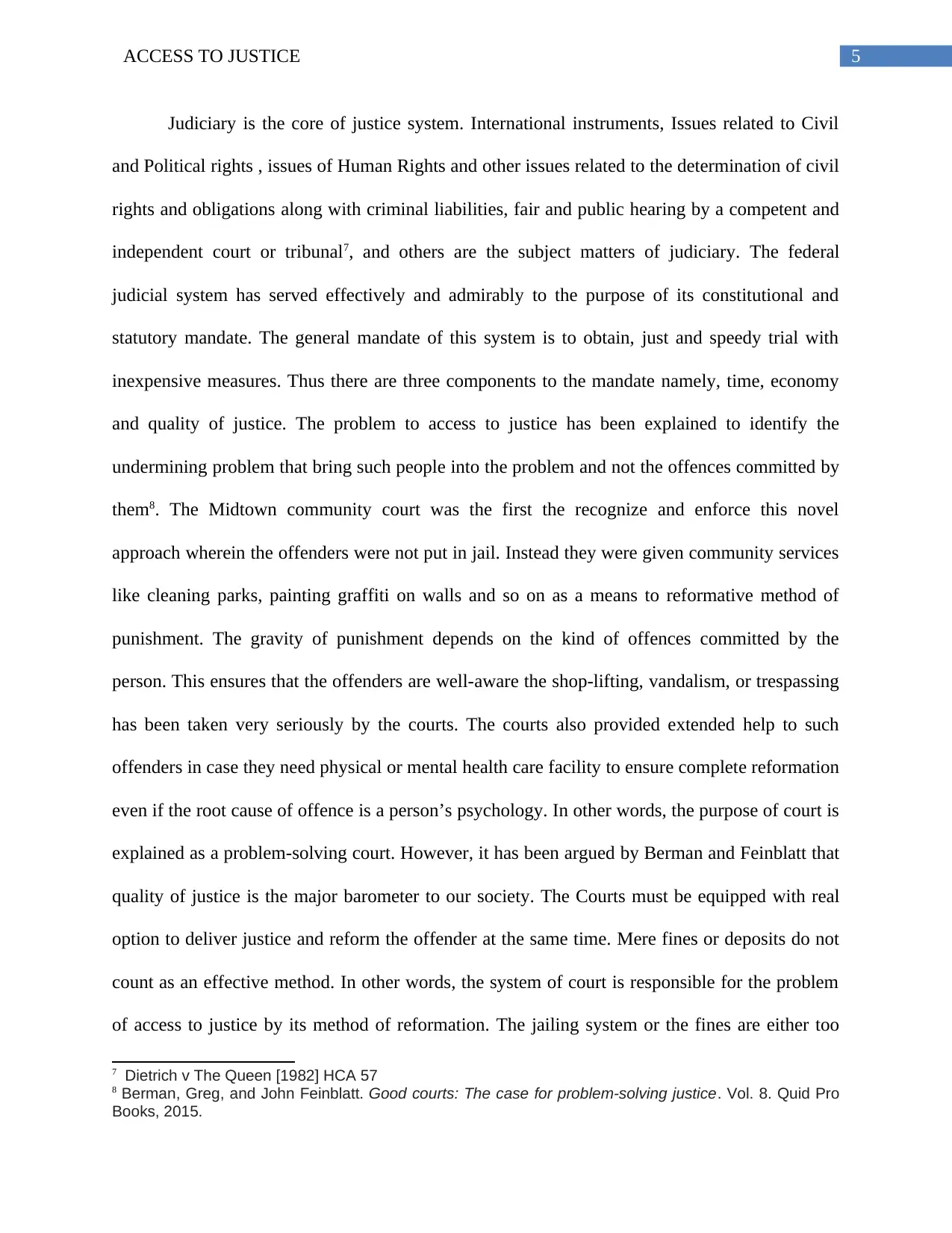
5ACCESS TO JUSTICE
Judiciary is the core of justice system. International instruments, Issues related to Civil
and Political rights , issues of Human Rights and other issues related to the determination of civil
rights and obligations along with criminal liabilities, fair and public hearing by a competent and
independent court or tribunal7, and others are the subject matters of judiciary. The federal
judicial system has served effectively and admirably to the purpose of its constitutional and
statutory mandate. The general mandate of this system is to obtain, just and speedy trial with
inexpensive measures. Thus there are three components to the mandate namely, time, economy
and quality of justice. The problem to access to justice has been explained to identify the
undermining problem that bring such people into the problem and not the offences committed by
them8. The Midtown community court was the first the recognize and enforce this novel
approach wherein the offenders were not put in jail. Instead they were given community services
like cleaning parks, painting graffiti on walls and so on as a means to reformative method of
punishment. The gravity of punishment depends on the kind of offences committed by the
person. This ensures that the offenders are well-aware the shop-lifting, vandalism, or trespassing
has been taken very seriously by the courts. The courts also provided extended help to such
offenders in case they need physical or mental health care facility to ensure complete reformation
even if the root cause of offence is a person’s psychology. In other words, the purpose of court is
explained as a problem-solving court. However, it has been argued by Berman and Feinblatt that
quality of justice is the major barometer to our society. The Courts must be equipped with real
option to deliver justice and reform the offender at the same time. Mere fines or deposits do not
count as an effective method. In other words, the system of court is responsible for the problem
of access to justice by its method of reformation. The jailing system or the fines are either too
7 Dietrich v The Queen [1982] HCA 57
8 Berman, Greg, and John Feinblatt. Good courts: The case for problem-solving justice. Vol. 8. Quid Pro
Books, 2015.
Judiciary is the core of justice system. International instruments, Issues related to Civil
and Political rights , issues of Human Rights and other issues related to the determination of civil
rights and obligations along with criminal liabilities, fair and public hearing by a competent and
independent court or tribunal7, and others are the subject matters of judiciary. The federal
judicial system has served effectively and admirably to the purpose of its constitutional and
statutory mandate. The general mandate of this system is to obtain, just and speedy trial with
inexpensive measures. Thus there are three components to the mandate namely, time, economy
and quality of justice. The problem to access to justice has been explained to identify the
undermining problem that bring such people into the problem and not the offences committed by
them8. The Midtown community court was the first the recognize and enforce this novel
approach wherein the offenders were not put in jail. Instead they were given community services
like cleaning parks, painting graffiti on walls and so on as a means to reformative method of
punishment. The gravity of punishment depends on the kind of offences committed by the
person. This ensures that the offenders are well-aware the shop-lifting, vandalism, or trespassing
has been taken very seriously by the courts. The courts also provided extended help to such
offenders in case they need physical or mental health care facility to ensure complete reformation
even if the root cause of offence is a person’s psychology. In other words, the purpose of court is
explained as a problem-solving court. However, it has been argued by Berman and Feinblatt that
quality of justice is the major barometer to our society. The Courts must be equipped with real
option to deliver justice and reform the offender at the same time. Mere fines or deposits do not
count as an effective method. In other words, the system of court is responsible for the problem
of access to justice by its method of reformation. The jailing system or the fines are either too
7 Dietrich v The Queen [1982] HCA 57
8 Berman, Greg, and John Feinblatt. Good courts: The case for problem-solving justice. Vol. 8. Quid Pro
Books, 2015.
⊘ This is a preview!⊘
Do you want full access?
Subscribe today to unlock all pages.

Trusted by 1+ million students worldwide
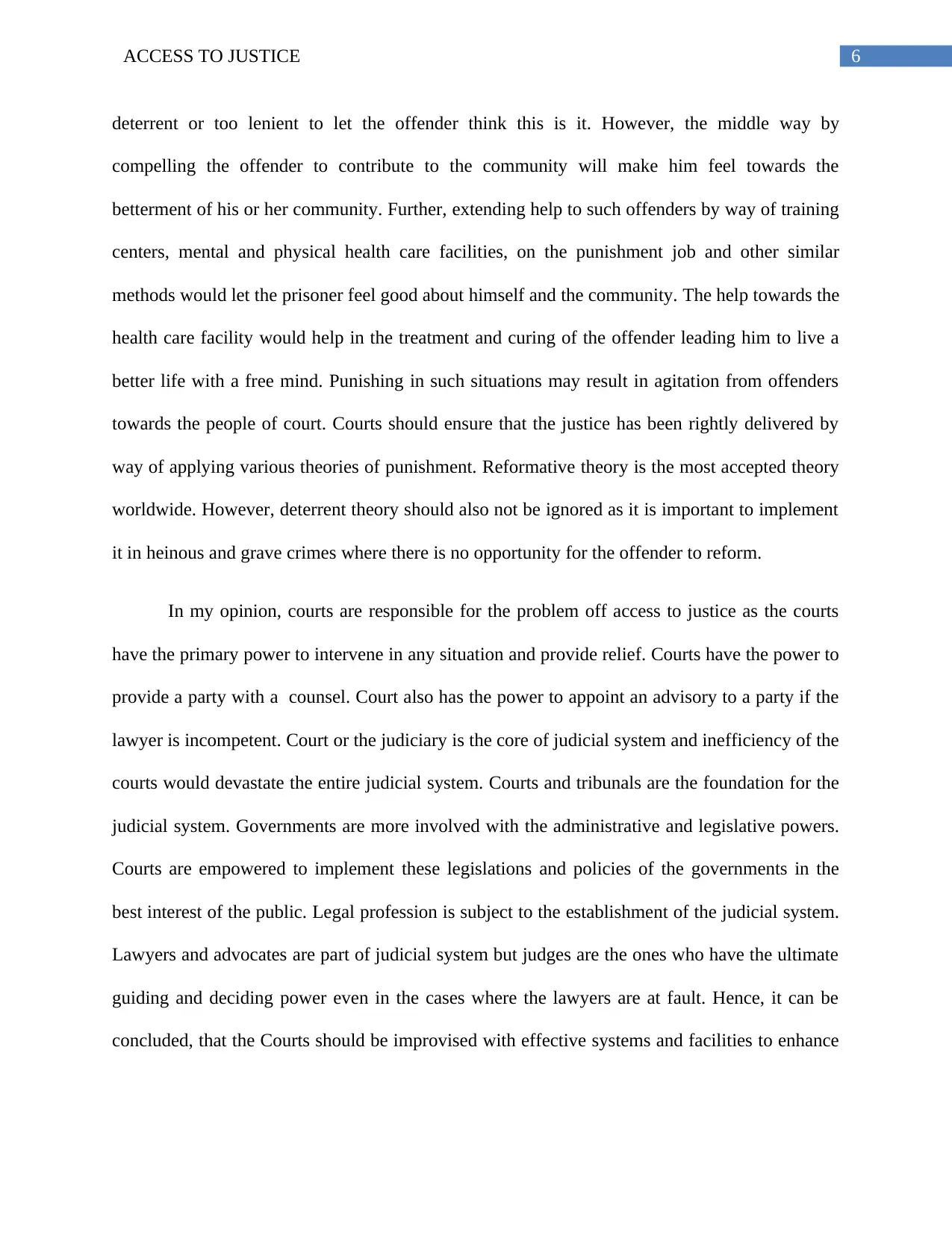
6ACCESS TO JUSTICE
deterrent or too lenient to let the offender think this is it. However, the middle way by
compelling the offender to contribute to the community will make him feel towards the
betterment of his or her community. Further, extending help to such offenders by way of training
centers, mental and physical health care facilities, on the punishment job and other similar
methods would let the prisoner feel good about himself and the community. The help towards the
health care facility would help in the treatment and curing of the offender leading him to live a
better life with a free mind. Punishing in such situations may result in agitation from offenders
towards the people of court. Courts should ensure that the justice has been rightly delivered by
way of applying various theories of punishment. Reformative theory is the most accepted theory
worldwide. However, deterrent theory should also not be ignored as it is important to implement
it in heinous and grave crimes where there is no opportunity for the offender to reform.
In my opinion, courts are responsible for the problem off access to justice as the courts
have the primary power to intervene in any situation and provide relief. Courts have the power to
provide a party with a counsel. Court also has the power to appoint an advisory to a party if the
lawyer is incompetent. Court or the judiciary is the core of judicial system and inefficiency of the
courts would devastate the entire judicial system. Courts and tribunals are the foundation for the
judicial system. Governments are more involved with the administrative and legislative powers.
Courts are empowered to implement these legislations and policies of the governments in the
best interest of the public. Legal profession is subject to the establishment of the judicial system.
Lawyers and advocates are part of judicial system but judges are the ones who have the ultimate
guiding and deciding power even in the cases where the lawyers are at fault. Hence, it can be
concluded, that the Courts should be improvised with effective systems and facilities to enhance
deterrent or too lenient to let the offender think this is it. However, the middle way by
compelling the offender to contribute to the community will make him feel towards the
betterment of his or her community. Further, extending help to such offenders by way of training
centers, mental and physical health care facilities, on the punishment job and other similar
methods would let the prisoner feel good about himself and the community. The help towards the
health care facility would help in the treatment and curing of the offender leading him to live a
better life with a free mind. Punishing in such situations may result in agitation from offenders
towards the people of court. Courts should ensure that the justice has been rightly delivered by
way of applying various theories of punishment. Reformative theory is the most accepted theory
worldwide. However, deterrent theory should also not be ignored as it is important to implement
it in heinous and grave crimes where there is no opportunity for the offender to reform.
In my opinion, courts are responsible for the problem off access to justice as the courts
have the primary power to intervene in any situation and provide relief. Courts have the power to
provide a party with a counsel. Court also has the power to appoint an advisory to a party if the
lawyer is incompetent. Court or the judiciary is the core of judicial system and inefficiency of the
courts would devastate the entire judicial system. Courts and tribunals are the foundation for the
judicial system. Governments are more involved with the administrative and legislative powers.
Courts are empowered to implement these legislations and policies of the governments in the
best interest of the public. Legal profession is subject to the establishment of the judicial system.
Lawyers and advocates are part of judicial system but judges are the ones who have the ultimate
guiding and deciding power even in the cases where the lawyers are at fault. Hence, it can be
concluded, that the Courts should be improvised with effective systems and facilities to enhance
Paraphrase This Document
Need a fresh take? Get an instant paraphrase of this document with our AI Paraphraser

7ACCESS TO JUSTICE
their applicability because they are vested with wide array of powers entrusted in them for public
interest and their safeguard.
their applicability because they are vested with wide array of powers entrusted in them for public
interest and their safeguard.
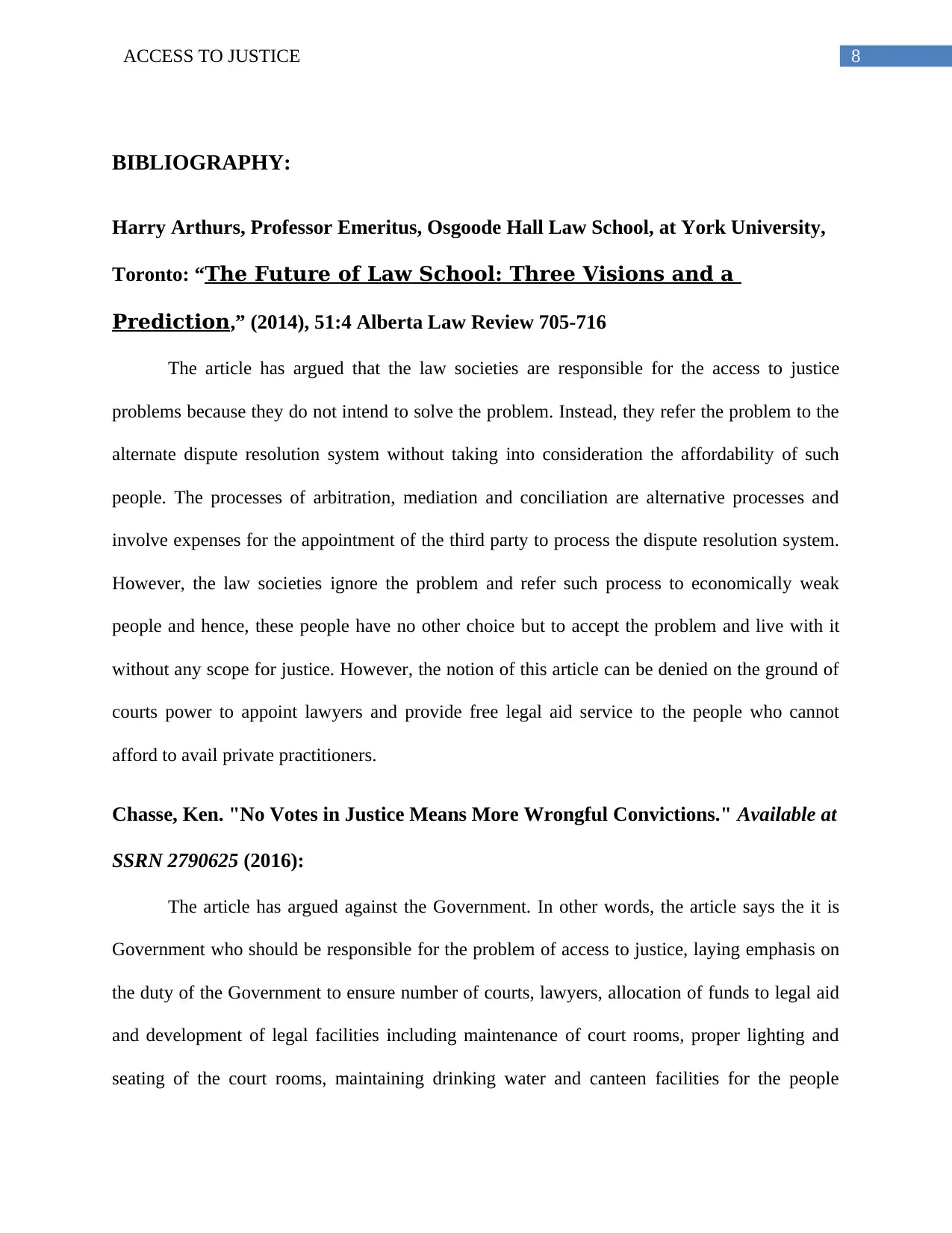
8ACCESS TO JUSTICE
BIBLIOGRAPHY:
Harry Arthurs, Professor Emeritus, Osgoode Hall Law School, at York University,
Toronto: “The Future of Law School: Three Visions and a
Prediction,” (2014), 51:4 Alberta Law Review 705-716
The article has argued that the law societies are responsible for the access to justice
problems because they do not intend to solve the problem. Instead, they refer the problem to the
alternate dispute resolution system without taking into consideration the affordability of such
people. The processes of arbitration, mediation and conciliation are alternative processes and
involve expenses for the appointment of the third party to process the dispute resolution system.
However, the law societies ignore the problem and refer such process to economically weak
people and hence, these people have no other choice but to accept the problem and live with it
without any scope for justice. However, the notion of this article can be denied on the ground of
courts power to appoint lawyers and provide free legal aid service to the people who cannot
afford to avail private practitioners.
Chasse, Ken. "No Votes in Justice Means More Wrongful Convictions." Available at
SSRN 2790625 (2016):
The article has argued against the Government. In other words, the article says the it is
Government who should be responsible for the problem of access to justice, laying emphasis on
the duty of the Government to ensure number of courts, lawyers, allocation of funds to legal aid
and development of legal facilities including maintenance of court rooms, proper lighting and
seating of the court rooms, maintaining drinking water and canteen facilities for the people
BIBLIOGRAPHY:
Harry Arthurs, Professor Emeritus, Osgoode Hall Law School, at York University,
Toronto: “The Future of Law School: Three Visions and a
Prediction,” (2014), 51:4 Alberta Law Review 705-716
The article has argued that the law societies are responsible for the access to justice
problems because they do not intend to solve the problem. Instead, they refer the problem to the
alternate dispute resolution system without taking into consideration the affordability of such
people. The processes of arbitration, mediation and conciliation are alternative processes and
involve expenses for the appointment of the third party to process the dispute resolution system.
However, the law societies ignore the problem and refer such process to economically weak
people and hence, these people have no other choice but to accept the problem and live with it
without any scope for justice. However, the notion of this article can be denied on the ground of
courts power to appoint lawyers and provide free legal aid service to the people who cannot
afford to avail private practitioners.
Chasse, Ken. "No Votes in Justice Means More Wrongful Convictions." Available at
SSRN 2790625 (2016):
The article has argued against the Government. In other words, the article says the it is
Government who should be responsible for the problem of access to justice, laying emphasis on
the duty of the Government to ensure number of courts, lawyers, allocation of funds to legal aid
and development of legal facilities including maintenance of court rooms, proper lighting and
seating of the court rooms, maintaining drinking water and canteen facilities for the people
⊘ This is a preview!⊘
Do you want full access?
Subscribe today to unlock all pages.

Trusted by 1+ million students worldwide
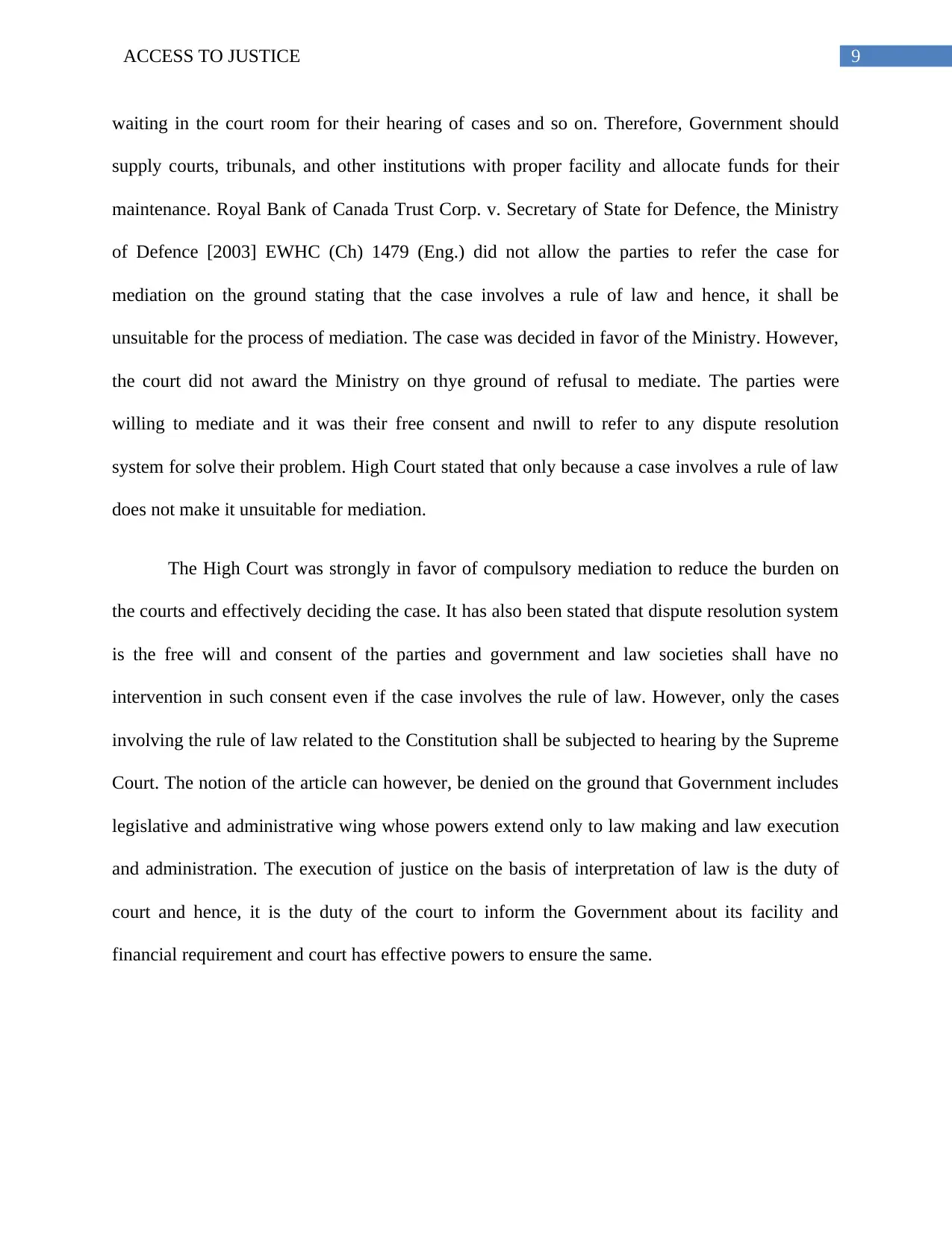
9ACCESS TO JUSTICE
waiting in the court room for their hearing of cases and so on. Therefore, Government should
supply courts, tribunals, and other institutions with proper facility and allocate funds for their
maintenance. Royal Bank of Canada Trust Corp. v. Secretary of State for Defence, the Ministry
of Defence [2003] EWHC (Ch) 1479 (Eng.) did not allow the parties to refer the case for
mediation on the ground stating that the case involves a rule of law and hence, it shall be
unsuitable for the process of mediation. The case was decided in favor of the Ministry. However,
the court did not award the Ministry on thye ground of refusal to mediate. The parties were
willing to mediate and it was their free consent and nwill to refer to any dispute resolution
system for solve their problem. High Court stated that only because a case involves a rule of law
does not make it unsuitable for mediation.
The High Court was strongly in favor of compulsory mediation to reduce the burden on
the courts and effectively deciding the case. It has also been stated that dispute resolution system
is the free will and consent of the parties and government and law societies shall have no
intervention in such consent even if the case involves the rule of law. However, only the cases
involving the rule of law related to the Constitution shall be subjected to hearing by the Supreme
Court. The notion of the article can however, be denied on the ground that Government includes
legislative and administrative wing whose powers extend only to law making and law execution
and administration. The execution of justice on the basis of interpretation of law is the duty of
court and hence, it is the duty of the court to inform the Government about its facility and
financial requirement and court has effective powers to ensure the same.
waiting in the court room for their hearing of cases and so on. Therefore, Government should
supply courts, tribunals, and other institutions with proper facility and allocate funds for their
maintenance. Royal Bank of Canada Trust Corp. v. Secretary of State for Defence, the Ministry
of Defence [2003] EWHC (Ch) 1479 (Eng.) did not allow the parties to refer the case for
mediation on the ground stating that the case involves a rule of law and hence, it shall be
unsuitable for the process of mediation. The case was decided in favor of the Ministry. However,
the court did not award the Ministry on thye ground of refusal to mediate. The parties were
willing to mediate and it was their free consent and nwill to refer to any dispute resolution
system for solve their problem. High Court stated that only because a case involves a rule of law
does not make it unsuitable for mediation.
The High Court was strongly in favor of compulsory mediation to reduce the burden on
the courts and effectively deciding the case. It has also been stated that dispute resolution system
is the free will and consent of the parties and government and law societies shall have no
intervention in such consent even if the case involves the rule of law. However, only the cases
involving the rule of law related to the Constitution shall be subjected to hearing by the Supreme
Court. The notion of the article can however, be denied on the ground that Government includes
legislative and administrative wing whose powers extend only to law making and law execution
and administration. The execution of justice on the basis of interpretation of law is the duty of
court and hence, it is the duty of the court to inform the Government about its facility and
financial requirement and court has effective powers to ensure the same.
Paraphrase This Document
Need a fresh take? Get an instant paraphrase of this document with our AI Paraphraser
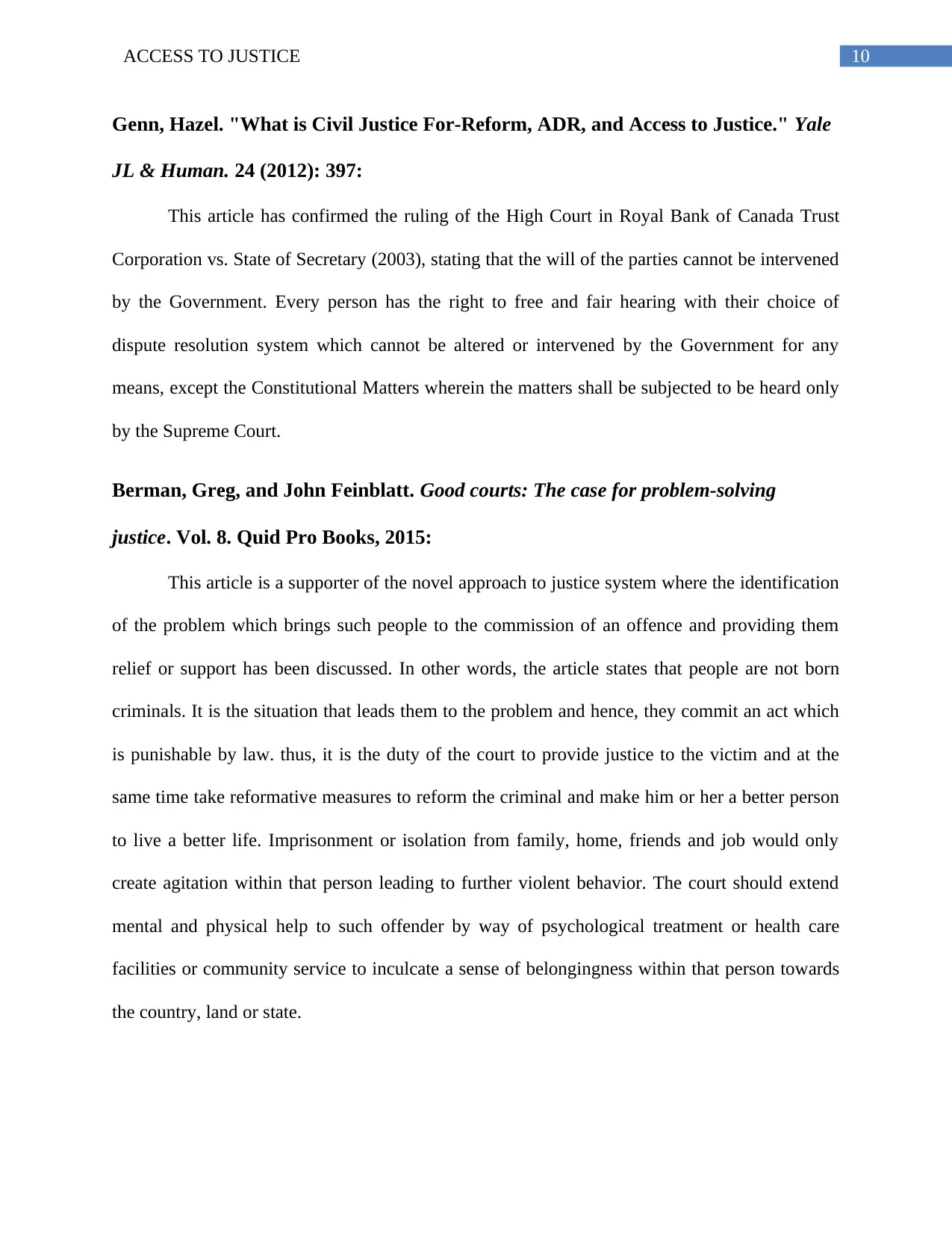
10ACCESS TO JUSTICE
Genn, Hazel. "What is Civil Justice For-Reform, ADR, and Access to Justice." Yale
JL & Human. 24 (2012): 397:
This article has confirmed the ruling of the High Court in Royal Bank of Canada Trust
Corporation vs. State of Secretary (2003), stating that the will of the parties cannot be intervened
by the Government. Every person has the right to free and fair hearing with their choice of
dispute resolution system which cannot be altered or intervened by the Government for any
means, except the Constitutional Matters wherein the matters shall be subjected to be heard only
by the Supreme Court.
Berman, Greg, and John Feinblatt. Good courts: The case for problem-solving
justice. Vol. 8. Quid Pro Books, 2015:
This article is a supporter of the novel approach to justice system where the identification
of the problem which brings such people to the commission of an offence and providing them
relief or support has been discussed. In other words, the article states that people are not born
criminals. It is the situation that leads them to the problem and hence, they commit an act which
is punishable by law. thus, it is the duty of the court to provide justice to the victim and at the
same time take reformative measures to reform the criminal and make him or her a better person
to live a better life. Imprisonment or isolation from family, home, friends and job would only
create agitation within that person leading to further violent behavior. The court should extend
mental and physical help to such offender by way of psychological treatment or health care
facilities or community service to inculcate a sense of belongingness within that person towards
the country, land or state.
Genn, Hazel. "What is Civil Justice For-Reform, ADR, and Access to Justice." Yale
JL & Human. 24 (2012): 397:
This article has confirmed the ruling of the High Court in Royal Bank of Canada Trust
Corporation vs. State of Secretary (2003), stating that the will of the parties cannot be intervened
by the Government. Every person has the right to free and fair hearing with their choice of
dispute resolution system which cannot be altered or intervened by the Government for any
means, except the Constitutional Matters wherein the matters shall be subjected to be heard only
by the Supreme Court.
Berman, Greg, and John Feinblatt. Good courts: The case for problem-solving
justice. Vol. 8. Quid Pro Books, 2015:
This article is a supporter of the novel approach to justice system where the identification
of the problem which brings such people to the commission of an offence and providing them
relief or support has been discussed. In other words, the article states that people are not born
criminals. It is the situation that leads them to the problem and hence, they commit an act which
is punishable by law. thus, it is the duty of the court to provide justice to the victim and at the
same time take reformative measures to reform the criminal and make him or her a better person
to live a better life. Imprisonment or isolation from family, home, friends and job would only
create agitation within that person leading to further violent behavior. The court should extend
mental and physical help to such offender by way of psychological treatment or health care
facilities or community service to inculcate a sense of belongingness within that person towards
the country, land or state.
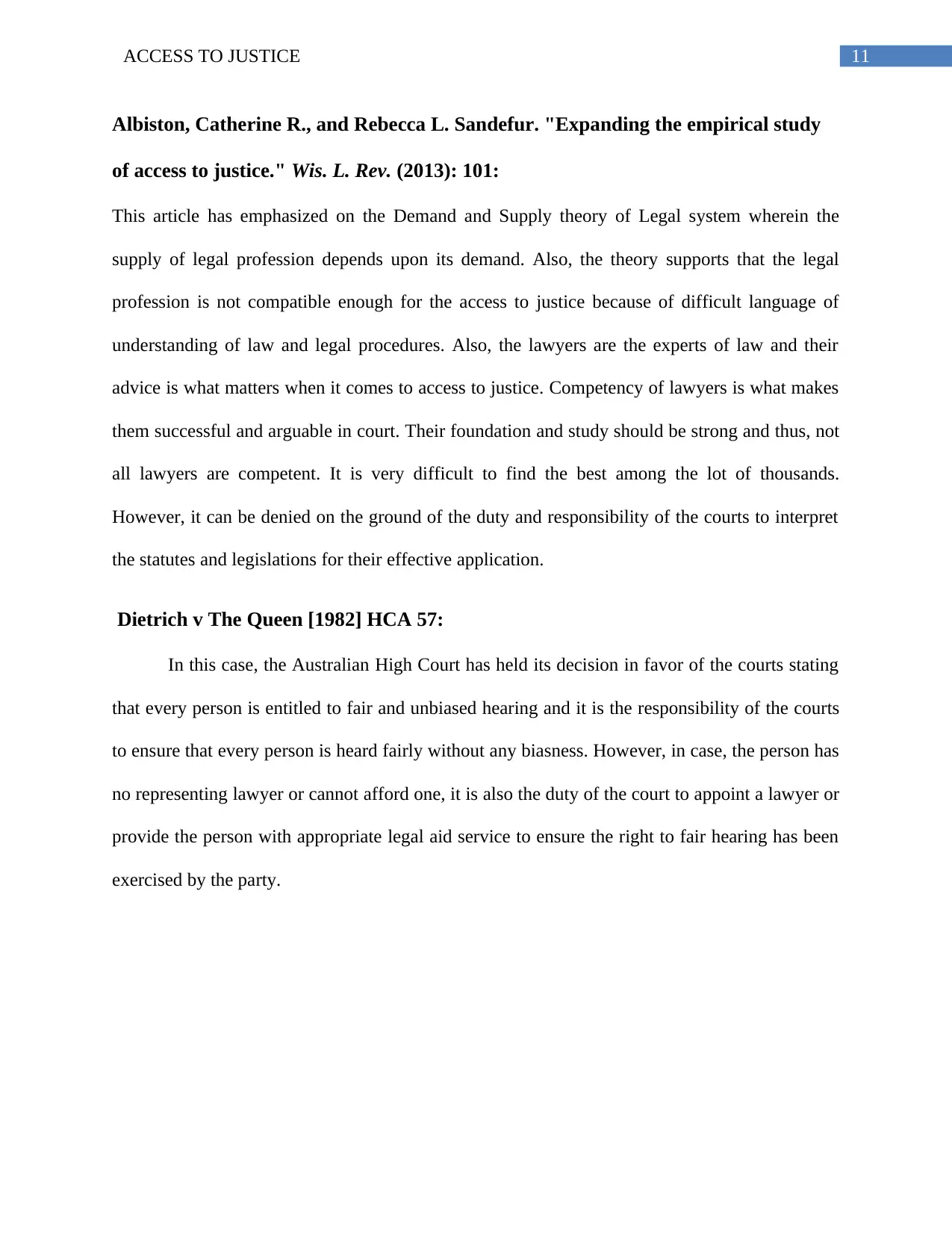
11ACCESS TO JUSTICE
Albiston, Catherine R., and Rebecca L. Sandefur. "Expanding the empirical study
of access to justice." Wis. L. Rev. (2013): 101:
This article has emphasized on the Demand and Supply theory of Legal system wherein the
supply of legal profession depends upon its demand. Also, the theory supports that the legal
profession is not compatible enough for the access to justice because of difficult language of
understanding of law and legal procedures. Also, the lawyers are the experts of law and their
advice is what matters when it comes to access to justice. Competency of lawyers is what makes
them successful and arguable in court. Their foundation and study should be strong and thus, not
all lawyers are competent. It is very difficult to find the best among the lot of thousands.
However, it can be denied on the ground of the duty and responsibility of the courts to interpret
the statutes and legislations for their effective application.
Dietrich v The Queen [1982] HCA 57:
In this case, the Australian High Court has held its decision in favor of the courts stating
that every person is entitled to fair and unbiased hearing and it is the responsibility of the courts
to ensure that every person is heard fairly without any biasness. However, in case, the person has
no representing lawyer or cannot afford one, it is also the duty of the court to appoint a lawyer or
provide the person with appropriate legal aid service to ensure the right to fair hearing has been
exercised by the party.
Albiston, Catherine R., and Rebecca L. Sandefur. "Expanding the empirical study
of access to justice." Wis. L. Rev. (2013): 101:
This article has emphasized on the Demand and Supply theory of Legal system wherein the
supply of legal profession depends upon its demand. Also, the theory supports that the legal
profession is not compatible enough for the access to justice because of difficult language of
understanding of law and legal procedures. Also, the lawyers are the experts of law and their
advice is what matters when it comes to access to justice. Competency of lawyers is what makes
them successful and arguable in court. Their foundation and study should be strong and thus, not
all lawyers are competent. It is very difficult to find the best among the lot of thousands.
However, it can be denied on the ground of the duty and responsibility of the courts to interpret
the statutes and legislations for their effective application.
Dietrich v The Queen [1982] HCA 57:
In this case, the Australian High Court has held its decision in favor of the courts stating
that every person is entitled to fair and unbiased hearing and it is the responsibility of the courts
to ensure that every person is heard fairly without any biasness. However, in case, the person has
no representing lawyer or cannot afford one, it is also the duty of the court to appoint a lawyer or
provide the person with appropriate legal aid service to ensure the right to fair hearing has been
exercised by the party.
⊘ This is a preview!⊘
Do you want full access?
Subscribe today to unlock all pages.

Trusted by 1+ million students worldwide
1 out of 12
Related Documents
Your All-in-One AI-Powered Toolkit for Academic Success.
+13062052269
info@desklib.com
Available 24*7 on WhatsApp / Email
![[object Object]](/_next/static/media/star-bottom.7253800d.svg)
Unlock your academic potential
Copyright © 2020–2026 A2Z Services. All Rights Reserved. Developed and managed by ZUCOL.





